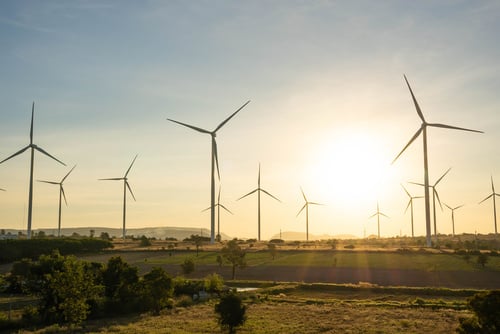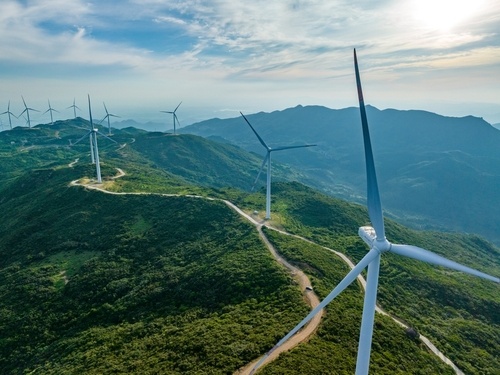Gas & Power
The rate of price declines between the first two quarters of 2023 have slowed by 6%. The general price trend over the summer period has been rangebound, with the Win-23 gas contract keeping within a 60p/therm range. Whilst strong confidence for the remainder of this summer season continues to remove some immediate risk premium, the market has been exposed to periods of high volatility linked to supply-side shocks. Since the beginning of Q3-23 a stronger contango has emerged across the forward contracts as asymmetric price risks for this winter period and beyond remain due to structural tightness in the global gas market.
Demand
Demand reduction continues to remain a key driver in the lower price environment. Price resistance has been linked to strong declines in gas demand across Europe. UK gas demand is currently 15% below the 6-month rolling average with the strongest declines observed in domestic heating requirement due to warmer temperatures. Healthy renewable power generation also coincided with reduced gas for power demand with UK industrial demand keeping around 50% below this time last year.
The lack of Russian gas flows has led to increased global competition for LNG in a race to fill gas storages. Recently the Asian LNG benchmark shifted into a premium against the European benchmark with the current spread sitting at $1.3/MMBtu. This provides less incentive to exporters such as the U.S to deliver LNG to Europe whereby flexible cargoes can be diverted to a higher price market. This has led to a 3bcm drop in total monthly European LNG imports since April-23.
The lack of rainfall this summer has dropped River Rhine levels to near historic lows in the Northern and Central parts which is pressuring transport logistics in Continental Europe. This leads to limited load capacity to transports goods to refineries.
The potential resurgence of gas demand in Asia from an El Nino event which correlates to hot weather conditions, along with reduced cold weather risk in Europe could widen the price differential between the Asian and European market and pose supply risks.
The combination of supply constraints and Europe’s target to have gas storages 90% full by 1Sst November has led to the European gas market shifting to a premium against the UK. This incentivised higher net UK exports to support electricity generation in the EU due to France’s high number of nuclear outages. The hydro balance in the EU are far below regular levels that may lead to increased usage of gas for power generation. Continued export demand leads to tighter domestic supply margins that could also add volatility to the prompt market.
Supply
LNG cargoes continue to arrive into Europe with frequency, although we have seen the number of cargos arriving into the UK declining. Despite this, the UK has remained well supplied, even through the recent period of heavy Norwegian maintenance. Norwegian oil and gas firm DNO has made a significant gas and condensate discovery at the Carmen prospect which was the largest find at the Norwegian continental shelf in a decade, holding 175MB of oil equivalent.
Asian LNG prices have consistently traded at a premium to European markets in recent weeks, although spot purchasing remains muted in the region. All eyes remain on Asian demand as this is expected to pick up later in 2023 and could materially impact the amount of LNG Europe receives.
Europe continues to bolster its LNG capabilities with 7 FSRUs now in operation and 4 more planned by year end. Centrica has signed a 15-year agreement to supply the UK market with US LNG. The arrangement involves supplying 1Mt of LNG each year for the next 15 years to the UK market. The delivery is expected to be 14 LNG cargos each year, with a market value of roughly $8 billion.
SEFE recently signed a 20-year LNG deal with Venture Global LNG for 2.25 million tonnes per annum, however, Europe needs to secure more long-term LNG deals to reduce exposure to volatile spot markets, particularly if a ban on Russian LNG goes ahead. Whilst European carbon reduction policy could be one barrier to securing longer-term LNG deals, another is the fact that most new LNG capacity is already tied into longer term deals. As a result, it is imperative that Europe diversifies its strategy for securing long-term LNG supply. One potential avenue is tapping into expiring legacy contracts. Globally, contracts totalling 93bcm are due to expire in 2023. This route could offer more flexibility and access to immediately available LNG, since longer-term SPAs for new projects are usually agreed years before gas is available for delivery.
Gas flows
Remaining Russian gas flows into Europe have been steady in recent weeks, although, Russia recently threatened to cut remaining flows via Ukraine due to ongoing litigation efforts by Ukraine’s Naftogaz. Ukraine is suing for lost assets in Crimea and Gazprom’s failure to ship the amount of gas stipulated in their gas transit agreement. Whether Russia would actually go ahead with severing this revenue source remains to be seen, but the existing gas transit deal between the counties expires at the end of 2024 so this could signal and end to flows via Ukraine from 2025.
Gas storage levels in Northwest Europe sit far above the 5-year average and could be on track to reach 95% fullness by September. UK storage is around 50% full but we expect this figure to improve from mid-July once flows return following Norwegian maintenance. Weather conditions for the remainder of summer will be key for gas storage levels as we head into the winter months. If heatwave conditions do emerge, both nuclear and hydro supply could be impacted at a time of increased demand for cooling. Gas fired power generation will be used to fill this gap, and with a further period of heavy Norwegian maintenance scheduled from late-August to late-September, gas storage could be called upon to meet demand.
Available French nuclear capacity currently sits at around 38GWh, with almost 12GW of extra capacity online compared with the same period last year. Output is forecast to climb rapidly from late-July to early September when available capacity is set to hit 46GWh. Any delay to the return of this capacity is a major risk factor heading into winter. France’s nuclear fleet is aging, and additional checks have been ordered across the fleet due to the discovery of thermal cracks at some plants. Delays to the maintenance schedule, or indeed these extra checks, could result in price spikes, as seen in December 2021.
Brent oil
In the wider energy complex Brent is currently 8% below prices observed since the start of second quarter however prices have generally been consolidating within a $10/bbl range since the beginning of May-23. Currently the market sits at the top of this range, hovering close to $80/bbl, supported by extended voluntary supply cuts from Saudi Arabia, Russia and Algeria. If fully implemented, that would lead to a combined reduction of 5.36mbpd versus August 2022 levels and possibly more as several countries in the OPEC+ producer group are unable to fulfil their output quotas. Before these announcements the IEA suggested the oil market was set to show a supply deficit of roughly 2mbpd in the second half of the year. However, the overall commodity sector, including crude oil, is suffering from risk of adversity due to Chinese growth worries and strength in U.S. economic data pointing to higher interest rates which could slow demand growth.
UK and EU Carbon
The UK and European carbon markets experienced a higher rate of divergence from Apri-23 to the beginning of June-23. The UK market was initially pressured by lower demand for permits indicated by general weakness in bid-to-cover ratios. Meanwhile EUA’s continued to remain supported above the 200-day moving average on periods of reduced auction volumes and the European parliament approving a number of reforms for the EU ETS. The expansion of the allowances scheme to the maritime sector, alongside the phasing out of free allowances were amongst the plethora of changes. From this point, the build up of net short positions, mild weather and additional auction supply from the RePowerEU sales provided strong price resistance, in contrast the UK market now supported by regulatory announcement signalling curtailed supply of allowances for the remainder of the ETS Cap and extending the emissions cap to additional sectors including waste management and domestic maritime transport.






